Round Noon: Don Quixote
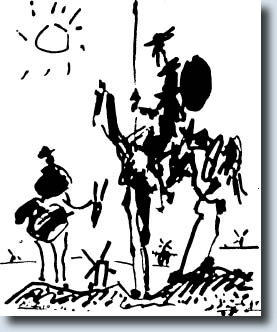
(Drawing by Pablo Picasso)
(p.s. my link is to the famous Ormsby translation, 1885, but if you can find the renowned Samuel Putnam translation, pounce.)
Sept. 29, 1547: Miguel de Cervantes is born
Miguel de Cervantes, author of Don Quixote, is born this day near Madrid.
Cervantes led an adventurous life and achieved much popular success, but he nevertheless struggled financially throughout his life. Little is know about his childhood, except that he was a favorite student of Madrid humanist Juan Lopez, and that his father was an apothecary.
In 1569, Cervantes was living in Rome and working for a future cardinal. Shortly thereafter, he enlisted in the Spanish fleet to fight against the Turks. At the Battle of Lepanto in 1571, he took three bullets and suffered permanent damage to his left hand. Later, he was stationed at Palermo and Naples. On the way home to Madrid in 1575, he and his brother Roderigo were captured by Barbary pirates and held captive in Algiers. Cervantes was ransomed after five years of captivity and returned to Madrid, where he began writing. Although his records indicate he wrote 20 to 30 plays, only two survive. In 1585, he published a romance. During this time, he married a woman 18 years younger than he was and had an illegitimate daughter, whom he raised in his household. He worked as a tax collector and as a requisitioner of supplies for the navy, but was jailed for irregularities in his accounting. Some historians believe he formulated the idea for Don Quixote while in jail.
In 1604, he received the license to publish Don Quixote. Although the book began as a satire of chivalric epics, it was far more complex than a simple satire. The book blended traditional genres to create a sad portrait of a penniless man striving to live by the ideals of the past. The book was a huge success and brought Cervantes literary respect and position, but did not generate much money. He wrote dramas and short stories until a phony sequel, penned by another writer, prompted him to write Don Quixote, Part II in 1615. He died the following year. (From The History Channel)
Round Noon: The Waste Land
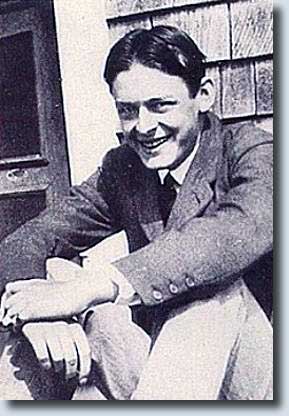
T.S. Eliot
Okay, two heros in one week, Faulkner and Eliot, heady stuff. No modern poet influenced my literary sensabilities more than Eliot. His seminal works, The Lovesong of J. Alfred Prufrock (reprinted below) and The Waste Land (linked above and below) broke all the boundaries and opened mulitple and theretofore undiscovered sets of eyelids; worlds collided, new worlds were created. 'Nuff said.
September 26, 1888: T.S. Eliot is born
"On this day, poet T.S. Eliot is born in St. Louis, Missouri.
Eliot's distinguished family tree included an ancestor who arrived in Boston in 1670 and another who founded Washington University in St. Louis. Eliot's father was a businessman, and his mother was involved in local charities.
Eliot took an undergraduate degree at Harvard, studied at the Sorbonne, returned to Harvard to study Sanskrit, and then studied at Oxford. After meeting poet and lifelong friend Ezra Pound, Eliot relocated to England. In 1915, he married Vivian Haigh-Wood, but the marriage was unhappy, partly due to her mental instability. She died in an institution in 1947.
Eliot began working at Lloyd's Bank in 1917, writing reviews and essays on the side. He founded a critical quarterly, Criterion, and quietly developed a new brand of poetry. His first major work, The Lovesong of J. Alfred Prufrock (reprinted in ful below), was published in 1917 and hailed as the invention of a new kind of poetry. His long, fragmented images and use of blank verse influenced nearly all future poets, as did his masterpiece The Waste Land, published in Criterion and the American review The Dial in 1922. While Eliot is best known for revolutionizing modern poetry, his literary criticism and plays were also successful. In 1925, he accepted a job as an editor at Faber and Faber, which allowed him to quit his job at the bank. He held the position for the rest of his life.
Eliot lectured in the United States frequently in the 1930s and 1940s, a time when his own worldview was fluctuating: He converted to Christianity. In 1957, he married his assistant, Valerie Fletcher. The couple lived happily until his death in 1965." (from The History Channel)
T.S. Eliot (1888–1965). Prufrock and Other Observations. 1917.
The Love Song of J. Alfred Prufrock
S’io credesse che mia risposta fosse
A persona che mai tornasse al mondo,
Questa fiamma staria senza piu scosse.
Ma perciocche giammai di questo fondo
Non torno vivo alcun, s’i’odo il vero,
Senza tema d’infamia ti rispondo.
LET us go then, you and I,
When the evening is spread out against the sky
Like a patient etherised upon a table;
Let us go, through certain half-deserted streets,
The muttering retreats
Of restless nights in one-night cheap hotels
And sawdust restaurants with oyster-shells:
Streets that follow like a tedious argument
Of insidious intent
To lead you to an overwhelming question …
Oh, do not ask, “What is it?”
Let us go and make our visit.
In the room the women come and go
Talking of Michelangelo.
The yellow fog that rubs its back upon the window-panes,
The yellow smoke that rubs its muzzle on the window-panes
Licked its tongue into the corners of the evening,
Lingered upon the pools that stand in drains,
Let fall upon its back the soot that falls from chimneys,
Slipped by the terrace, made a sudden leap,
And seeing that it was a soft October night,
Curled once about the house, and fell asleep.
And indeed there will be time
For the yellow smoke that slides along the street,
Rubbing its back upon the window-panes;
There will be time, there will be time
To prepare a face to meet the faces that you meet;
There will be time to murder and create,
And time for all the works and days of hands
That lift and drop a question on your plate;
Time for you and time for me,
And time yet for a hundred indecisions,
And for a hundred visions and revisions,
Before the taking of a toast and tea.
In the room the women come and go
Talking of Michelangelo.
And indeed there will be time
To wonder, “Do I dare?” and, “Do I dare?”
Time to turn back and descend the stair,
With a bald spot in the middle of my hair—
[They will say: “How his hair is growing thin!”]
My morning coat, my collar mounting firmly to the chin,
My necktie rich and modest, but asserted by a simple pin—
[They will say: “But how his arms and legs are thin!”]
Do I dare
Disturb the universe?
In a minute there is time
For decisions and revisions which a minute will reverse.
For I have known them all already, known them all:—
Have known the evenings, mornings, afternoons,
I have measured out my life with coffee spoons;
I know the voices dying with a dying fall
Beneath the music from a farther room.
So how should I presume?
And I have known the eyes already, known them all—
The eyes that fix you in a formulated phrase,
And when I am formulated, sprawling on a pin,
When I am pinned and wriggling on the wall,
Then how should I begin
To spit out all the butt-ends of my days and ways?
And how should I presume?
And I have known the arms already, known them all—
Arms that are braceleted and white and bare
[But in the lamplight, downed with light brown hair!]
It is perfume from a dress
That makes me so digress?
Arms that lie along a table, or wrap about a shawl.
And should I then presume?
And how should I begin?
. . . . .
Shall I say, I have gone at dusk through narrow streets
And watched the smoke that rises from the pipes
Of lonely men in shirt-sleeves, leaning out of windows?…
I should have been a pair of ragged claws
Scuttling across the floors of silent seas.
. . . . .
And the afternoon, the evening, sleeps so peacefully!
Smoothed by long fingers,
Asleep … tired … or it malingers,
Stretched on the floor, here beside you and me.
Should I, after tea and cakes and ices,
Have the strength to force the moment to its crisis?
But though I have wept and fasted, wept and prayed,
Though I have seen my head [grown slightly bald] brought in upon a platter,
I am no prophet—and here’s no great matter;
I have seen the moment of my greatness flicker,
And I have seen the eternal Footman hold my coat, and snicker,
And in short, I was afraid.
And would it have been worth it, after all,
After the cups, the marmalade, the tea,
Among the porcelain, among some talk of you and me,
Would it have been worth while,
To have bitten off the matter with a smile,
To have squeezed the universe into a ball
To roll it toward some overwhelming question,
To say: “I am Lazarus, come from the dead,
Come back to tell you all, I shall tell you all”—
If one, settling a pillow by her head,
Should say: “That is not what I meant at all.
That is not it, at all.”
And would it have been worth it, after all,
Would it have been worth while,
After the sunsets and the dooryards and the sprinkled streets,
After the novels, after the teacups, after the skirts that trail along the floor—
And this, and so much more?—
It is impossible to say just what I mean!
But as if a magic lantern threw the nerves in patterns on a screen:
Would it have been worth while
If one, settling a pillow or throwing off a shawl,
And turning toward the window, should say:
“That is not it at all,
That is not what I meant, at all.”
. . . . .
No! I am not Prince Hamlet, nor was meant to be;
Am an attendant lord, one that will do
To swell a progress, start a scene or two,
Advise the prince; no doubt, an easy tool,
Deferential, glad to be of use,
Politic, cautious, and meticulous;
Full of high sentence, but a bit obtuse;
At times, indeed, almost ridiculous—
Almost, at times, the Fool.
I grow old … I grow old …
I shall wear the bottoms of my trousers rolled.
Shall I part my hair behind? Do I dare to eat a peach?
I shall wear white flannel trousers, and walk upon the beach.
I have heard the mermaids singing, each to each.
I do not think that they will sing to me.
I have seen them riding seaward on the waves
Combing the white hair of the waves blown back
When the wind blows the water white and black.
We have lingered in the chambers of the sea
By sea-girls wreathed with seaweed red and brown
Till human voices wake us, and we drown.
11:17pm: The Sound and The Fury
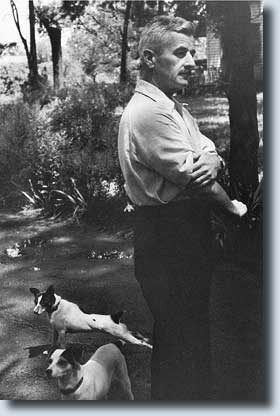
William Faulkner, Oxford, Mississippi, 1947
(Photo by Henri Cartier-Bresson)
September 25, 1897: William Faulkner is born
Many of you know I am a writer; even if you don't know me personally, references and links to my published work are herewith abundant. But even those of you who do know me may not know that William Faulkner is the writer who most influenced me as a young artist. I read all his work, voraciously and repeatedly, everything I could get my hands on. Of course, later influences followed, chiefly the existentialists (Dostoevsky, Kierkegaard, Kafka, Beckett, Camus, Sartre). But my eyes were first opened to the possibilities of fiction by the phenomenol work of Faulkner, from his most simple and poignant, as "A Rose for Emily" to his most complex and enigmatic, as "Carcasonne." From his masterpiece, "The Sound and The Fury" (Click for full online text), to his equally great novels "As I Lay Dying," "Absolom, Absolom," "Light In August," and "Intruder In The Dust," to name just a few, but they are all masterpieces. Faulkner found a new way to use the English language, and he exploited its possibilities endlessly, driving its nuances and subtleties perhaps beyond its intended boundaries, if a language can be said to have intended boundaries. It is probably truer to say he simply found more wide-reaching places for our language to go, and took us there unabashedly, mesmerizing us with its wondrous grandeur, his artistic vision, and the skillful precision of his craft. Here is a brief bio from The History Channel:
"William Faulkner is born this day near Oxford, Mississippi. Faulkner's father was the business manager of the University of Mississippi, and his mother was a literary woman who encouraged Faulkner and his three brothers to read.
Faulkner was a good student but lost interest in studies during high school. He dropped out sophomore year and took a series of odd jobs while writing poetry.
In 1918, his high school girlfriend, Estelle Oldham, married another man, and Faulkner left Mississippi. He joined the British Royal Flying Corps, but World War I ended before he finished his training in Canada, and he returned to Mississippi. A neighbor funded the publication of his first book of poems, The Marble Faun (1924). His first novel, Soldiers' Pay, was published two years later.
In 1929, Faulkner finally married Estelle, his high school sweetheart, who had divorced her first husband after having two children. The couple bought a ruined mansion near Oxford and began restoring it while Faulkner finished The Sound and the Fury, published in October 1929. The book opens with the interior monologue of a developmentally disabled mute character. His next book, As I Lay Dying (1930), featured 59 different interior monologues. Light in August (1932) and Absalom, Absalom (1936) also challenged traditional forms of fiction.
Faulkner's difficult novels did not earn him enough money to support his family, so he supplemented his income selling short stories to magazines and working as a Hollywood screenwriter. He wrote two critically acclaimed films, both starring Humphrey Bogart: To Have and Have Not was based on an Ernest Hemingway novel, and The Big Sleep was based on a mystery by Raymond Chandler.
Faulkner's reputation received a significant boost with the publication of The Portable Faulkner (1946), which included his many stories set in Yoknapatawpha county. Three years later, in 1949, he won the Nobel Prize in literature. His Collected Stories (1950) won the National Book Award. During the rest of his life, he lectured frequently on university campuses. He died of a heart attack at age 55 [sic-he died on July 6, '62, at the age of 64, g.d.]." (from The History Channel)
2:14am: Magellan finds the Pacific
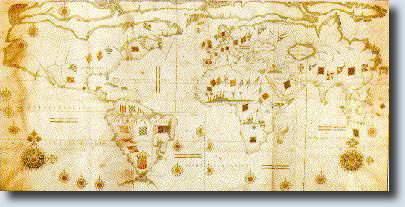
September 20, 1519: Magellan sets out
Portuguese navigator Ferdinand Magellan sets sail from Spain in an effort to find a western sea route to the rich Spice Islands of Indonesia. In command of five ships and 270 men, Magellan sailed to West Africa and then to Brazil, where he searched the South American coast for a strait that would take him to the Pacific. He searched the Río de la Plata, a large estuary south of Brazil, for a way through; failing, he continued south along the coast of Patagonia. At the end of March 1520, the expedition set up winter quarters at Port St. Julian. On Easter day at midnight, the Spanish captains mutinied against their Portuguese captain, but Magellan crushed the revolt, executing one of the captains and leaving another ashore when his ship left St. Julian in August.

Ferdinand Magellan
On October 21, he finally discovered the strait he had been seeking. The Strait of Magellan, as it became known, is located near the tip of South America, separating Tierra del Fuego and the continental mainland. Only three ships entered the passage; one had been wrecked and another deserted. It took 38 days to navigate the treacherous strait, and when ocean was sighted at the other end Magellan wept with joy. He was the first European explorer to reach the Pacific Ocean from the Atlantic. His fleet accomplished the westward crossing of the ocean in 99 days, crossing waters so strangely calm that the ocean was named "Pacific," from the Latin word pacificus, meaning "tranquil." By the end, the men were out of food and chewed the leather parts of their gear to keep themselves alive. On March 6, 1521, the expedition landed at the island of Guam.
Ten days later, they dropped anchor at the Philippine island of Cebú--they were only about 400 miles from the Spice Islands. Magellan met with the chief of Cebú, who after converting to Christianity persuaded the Europeans to assist him in conquering a rival tribe on the neighboring island of Mactan. In fighting on April 27, Magellan was hit by a poisoned arrow and left to die by his retreating comrades.
After Magellan's death, the survivors, in two ships, sailed on to the Moluccas and loaded the hulls with spice. One ship attempted, unsuccessfully, to return across the Pacific. The other ship, the Vittoria, continued west under the command of Basque navigator Juan Sebastián de Elcano. The vessel sailed across the Indian Ocean, rounded the Cape of Good Hope, and arrived at the Spanish port of Sanlúcar de Barrameda on September 6, 1522, becoming the first ship to circumnavigate the globe. (From The History Channel)
5:14pm: Brave New World and the Doors of Perception
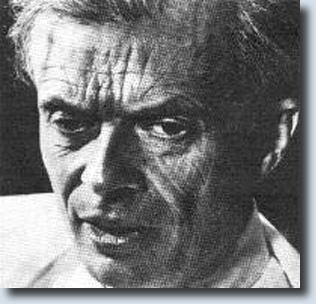
Aldous Huxley
"On this day in 1917, 23-year-old Aldous Huxley, future author of Brave New World is hired as a schoolmaster at Eton. One of his pupils will be Eric Blair, who will later use the pen name George Orwell.
Huxley was born into a prominent family. His grandfather was a famous biologist and proponent of Darwin, and his father was a respected biographer. Huxley hoped to become a scientist like his grandfather, but his dreams were shattered when a medical condition robbed him of most of his sight while he was a student at Eton.
Barely able to read, he nevertheless graduated from Oxford in 1916, the same year his first book appeared. The following year, he began teaching. His near-blindness disqualified him from service in World War I. From 1919 to 1921, he edited a publication called Athenaeum. In 1919, he married and had one son. The family moved to Italy in 1920 and lived most of the next several decades there while traveling widely. His satirical novels Crome Yellow (1921) and Antic Hay (1923) were successful, and he wrote full time for the rest of his life, churning out 47 books and many articles, essays, and screenplays.
His 1928 book, Point Counterpoint, became a bestseller, and in 1932 he published his masterwork Brave New World, which he wrote in four months. The book paints a dark vision of a future where individual emotion, creativity, and impulse have been completely subordinated to the tyrannical state.
In 1937, Huxley moved to California, where he became a screenwriter. His screenplays include Pride and Prejudice (1940), starring Laurence Olivier, and Jane Eyre (1944). In the 1950s, Huxley became a proponent of the controlled use of psychedelic drugs to liberate the mind. He wrote two books about his experiences using LSD and mescaline under supervision: The Doors of Perception (inspiring the name of the rock group The Doors) and Heaven and Hell. Huxley’s first wife died in 1955, and he remarried in 1956. His 1962 novel, Island, envisioned a utopian society where psychedelic drugs are used for religious rituals. Huxley died in Los Angeles in 1963." (From The History Channel)
12:00am: One Year Ago
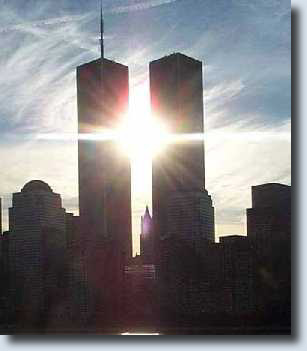
Written Sept. 18, 2001:
"It is one week since the devastating attack upon the World Trade Centers and the Pentagon, and I am just beginning to return to what may be described as a quasi-normal existence, although I must confess that, for me, there will never truly be any returning to anything resembling life as it used to be. On Tuesday morning, Sept.11, I had awakened early and was at my desk here at home, on the upper east side of Manhattan, writing at 7:30 a.m. By 9:00 I was backing up my work to an online storage site I use, and had turned on the T.V. to catch an early edition of SportsCenter, wanting to monitor their take on the Giants blow-out loss to the Broncos on Monday Night Football. The phone rang at 9:15 and it was my best pal Rand, asking me... "Are you watching this?"
"What, SportsCenter?" I smiled, knowing Rand is not much of a sports fan.
"No," he said, "the World Trade Center. Two planes just flew into the towers."
I flipped to CNN News, and was dumbfounded to see the Twin Towers smoking and burning some 80 or 100 blocks to the south.
"I'll let you go so you can watch," Rand said, "just wanted to give you the heads-up."
"Thank-you, brother," I said, "I'll call you later," and hung up the phone and began watching what was rapidly becoming the most devastating event in American history.
Everything has changed since that day. It is hard to imagine that less than 2 weeks earlier Rand and I were vacationing together at my friend David's camp on a pristine lake in Maine, with our other best friend Duncan, and Ian, a new addition to our tight circle of friendship and comraderie. I grew up very near there, and spent many days and nights at that beautiful, still-virgin location. It has not changed very much, even in 35 years. We fished morning and night, releasing our catches as we have always done, and played 36 to 54 holes of frisbee golf every afternoon on a course Rand and I laid out our first two days there. Frivolous activities, and perfect vacation diversions; how trivial and meaningless they now seem in the wake of the 9-11 attacks.
When I practiced law I tried arbitration cases at the the N.L.R.B. offices in the North Tower, and had business in both towers on occasions too numerous to mention. I have been to Windows On The World at the top of the North Tower, the observation deck at the top of the South Tower, and taken the PATH train which runs below-ground. Like everyone else, the towers had become part of the topography of my life, standing tall as they did at the lower tip of Manhattan, obtrusive and majestic and, if you have seen them even but once, unforgettable. They were marvels of architecture, maybe the eighth or ninth or tenth wonders of the world. But in their essence they were merely colossal structures; it took people to breathe life into them, people that mobilized and animated the internal organs of these great microcosms of the universe, people from every walk of life, representing every nationality, ethnicity, race, creed and color.
But now they are gone.
The buildings can be rebuilt, but the people have been lost.
I struggle to find words to describe the depth of sadness in my heart, but find no words that reach far enough.
I watched, disbelieving, on live television as the South Tower came down like a crumbling house of cards, and the cameras showed brave Fire Fighters and Police Officers and Emergency Service Workers rushing into the North Tower, just after, and I was saying to my television to tell them to come back, that this one is surely coming down as well...
But lives were in danger and so they followed their instincts and their livlihoods and their bravery and nobility, and into the tower they went, heroes all, and they will never be forgotten...
The nakedness that now defines Manhattan's skyline, where once the Twin Towers reigned so supremely, mirrors the bleak sorrow of a heart that had learned to find comfort in knowing there were no greater depths of sadness to probe in this life and in this time, only to find, so tragically, that I was mistaken...
I want to believe that for every soul we have lost a new star is shining in the night sky that rises above us where Twin Towers once stood; and if that is so we can take great hope, for these bright lights will guide us as we struggle to clear away the rubble and forge a path back to the freedom and truth we sometimes have taken for granted but never forgotten, have fostered and nurtered and struggled and fought for, have learned and re-learned and learned again to live for...and die if need be.
New York City, 18 Sept '01"
We remember. We will always remember.
6:00pm: A Lovely Sight
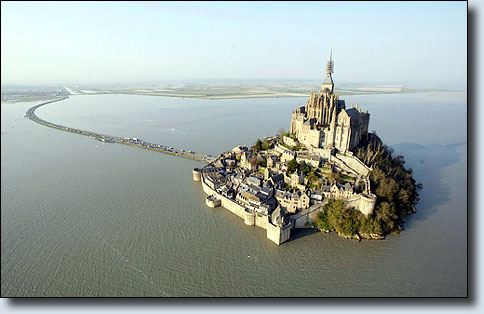
Mont-St.-Michel
From the New York Times:
"MONT-ST.-MICHEL JOURNAL:
Battle for the Future Swirls Below Proud Towers
By JOHN TAGLIABUE
MONT-ST.-MICHEL, France — For over a thousand years, the monastery here has thrust skyward out of the sea, like the pointed finger of some giant piercing the earth's crust. The image favored by visitors is at high tide, when it rises islandlike from the smooth waters of the bay that shares its name.
Though dedicated to monastic peace, the place has always been the theater of
conflict: between the earth and the eroding sea, between the English and French, and between the religious and the profane — as during the French Revolution, when the monks were dispersed and the monastery dedicated to the Archangel Michael, France's protector, was converted to a prison..."
(From The New York Times, Click for Full Article & Slide Show)
11:14pm: One Of A Kind
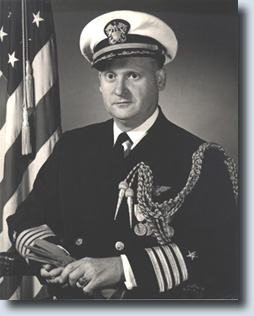
Capt. Arch McEwan
We lost a dear friend and great man this month, when Arch McEwan passed away on August 21, in his birthplace of Greenock, Scotland. Archie was my best friend Duncan's father, and I have known him nearly as long as I've known my pal, which is going on 23 years. I have known many people in my day, and none was as unique and magnificent as the man we all called Archie. A thinking man's man, with a rare intellect, keen sense of humor, and energetic spirit, Archie McEwan was the patriarch of one of the great families I have known. It was always an honor to call him my friend; it is an honor, now, to remember him.
Those of you who know Duncan but haven't had the pleasure of meeting the rest of his clan can well imagine the kind of family he comes from, for you will agree he is among the rarest of individuals. Even if you have only seen him perform on stage you have been privy to the keen intellect and quick wit that is as much a part of his personality as his kindred spirit and easy manner. And when you met Archie, you found out why, for here was a man who possessed equal measures of intelligence and humor, cunning and compassion, a man with a quick wit, and quicker smile. He was a patriarch in the truest sense of the world: he and his lovely wife Maria brought children into the world, John, James, and Bob, nurtured and raised them, instilled in them morals and values, and gave them love. It was always such a great pleasure to watch this family just being a family, the humor and good nature, the caring and compassion, that is born only of a deep-seated sense of belonging, of family.
The first time I met Archie was in a yellow cab on the way to court. I was waiting at the corner for Dunc to pick me up, he'd just retrieved his folks from the airport and we were on our way to testify at an arbitration proceeding that turned into a merry-go-round of an application for an injunction at Supreme Court, but that is another story. I step into the back seat of the cab and there is Duncan in the front seat and Archie in the middle with Maria beside him. Duncan is leaning over the seat introducing us, and I am trying to make a good impression on my pal's parents, here, who I'm meeting for the first time on our way to a very important legal proceeding, when Duncan says "give it to him, do you have it?" Well, Archie pulls a plastic shopping bag from the briefcase on his lap and hands it to me.
"This is from Bob," he says, and I had no way of appreciating his inuendo at that moment. I opened the bag and pulled out a tattered football jersey, white with royal blue numbers on front and back, number "22."
"What's this?" I said, quite dumbfounded.
"It's Bob Hayes's practice jersey," Dunc said from the front seat.
I looked at Archie, who was smiling at me, that big, friendly, toothy grin that was his trademark.
"Are you kidding?" I said to Archie.
"Bob asked me to bring it, he wants you to have it," Archie said, smiling away.
Of course, he meant his son Bob, whom we all call Duncan. And it was true, it was Bob Hayes's practice jersey from the Dallas Cowboys, a gift to Dunc from the fastest man on earth back in the days when Archie was the State Department Attache to Peru and Bob Hayes was on a good will tour of the country. It still is, and I still have it.
But talk about your "hello, glad to meet you." I know it was a gift from Duncan, but whenever I see that jersey, pull it out of my drawer and pull it over my shoulders, I remember Archie extracting it from his briefcase in the back seat of a yellow cab at the moment I met him for the very first time. We were in a hurry to get to a very important legal proceeding, in a crowded cab on a gridlocked city street, and here is Arch McEwan bearing gifts, and of the most memorable kind. I don't think anyone could ever top that introduction; that is how I met Archie, and every time I saw him it only got better. He was a wonderful spirit, one bright and shining jewel in a tedious drawer full of rhinestones.
Archie was 82, and there isn't one of us who wasn't convinced he wouldn't live to be a hundred. He didn't, of course, but if he had to leave us, we are happy he was able to take his leave peacefully. He was visiting his homeland and birthplace, Greenock, Scotland, with his wife Maria and his two younger boys, Duncan and James. He'd spent the day seeing his hometown, the house he grew up in, the church he attended, and passed quietly in his sleep during the night.
Archie was so proud of his boys, you could see the gleam in his eye whenever he came up to the city for one of Duncan's gigs. I know his family is proud of him, of the man he was, and the legacy he leaves behind. We will miss you, Arch, and you will be with us always. Let's go sailing out on Barrow Bay.

Click "More..." for Washington Post Article on USN Capt. Archibald John McEwan:
McEWAN, ARCHIBALD JOHN, CAPT USN (Ret.) (age 82)
Of Alexandria, VA, died on August 21, 2002 during a visit, with his family, to his birthplace of Greenock, Scotland. After immigrating to America in 1927, Captain McEwan graduated from Brooklyn Technical High School, went on to the College of the City of New York and earned a Masters in Electrical Engineering from the US Naval Academy Post Graduate School. He holds 3 patents for facilitating aircraft landing on carriers.
Serving first as a World War II naval aviator, Captain McEwan later represented the Joint Chiefs of Staff as Chairman of the US Delegation to NATO and served as Chief of Research on numerous arms control and disarmament projects. Subsequent tours included diplomatic service in Argentina, Paraguay, and Peru as Naval and Defense Attaché. He retired from the United States Navy in 1972. Captain McEwan received numerous commendations, including the Legion of Merit as well as foreign awards, including the Naval Order of Merit (Peruvian Cross). Upon returning to Virginia, Captain McEwan helped form Technology Advancement Group, a high-tech tactical computer company specializing in military and intelligence applications.
Captain McEwan is survived by his beloved wife of 50 years, Maria Luisa of Santurce, Puerto Rico; three sons, John Arthur, James Stewart and Robert Duncan, five grandchildren, three sisters and one brother.
A memorial service will be held on Thursday, September 5, 2002 at Bethany Lutheran Church, 2501 Beacon Hill Rd, Alexandria. A reception following the service will be held at Belle Haven Country Club.
Interment will be Monday, October 7, 2002, 11am at Arlington National Cemetery. In lieu of flowers, the family is asking for donations in memory of Captain A. J. McEwan to be sent to the US Navy Memorial Foundation, 701 Pennsylvania Ave NW, Suite 123, Washington DC, 20004-2608.
Round Midnite: 1777-Our First Flag; 1783-The Treaty of Paris

September 3, 1777: The Stars and Stripes flies
"The American flag is flown in battle for the first time, during a Revolutionary War skirmish at Cooch's Bridge, Maryland. Patriot General William Maxwell ordered the stars and strips banner raised as a detachment of his infantry and cavalry met an advance guard of British and Hessian troops. The rebels were defeated and forced to retreat to General George Washington's main force near Brandywine Creek in Pennsylvania.
Three months before, on June 14, the Continental Congress adopted a resolution stating that "the flag of the United States be thirteen alternate stripes red and white" and that "the Union be thirteen stars, white in a blue field, representing a new Constellation." The national flag, which became known as the "Stars and Stripes," was based on the "Grand Union" flag, a banner carried by the Continental Army in 1776 that also consisted of 13 red and white stripes. According to legend, Philadelphia seamstress Betsy Ross designed the new canton for the Stars and Stripes, which consisted of a circle of 13 stars and a blue background, at the request of General George Washington. Historians have been unable to conclusively prove or disprove this legend.
With the entrance of new states into the United States after independence, new stripes and stars were added to represent new additions to the Union. In 1818, however, Congress enacted a law stipulating that the 13 original stripes be restored and that only stars be added to represent new states.
On June 14, 1877, the first Flag Day observance was held on the 100th anniversary of the adoption of the Stars and Stripes. As instructed by Congress, the U.S. flag was flown from all public buildings across the country. In the years after the first Flag Day, several states continued to observe the anniversary, and in 1949 Congress officially designated June 14 as Flag Day, a national day of observance." (From The History Channel)
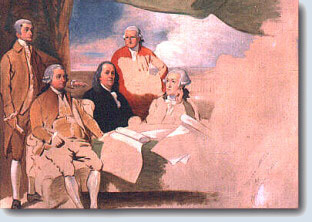
Treaty of Paris, 1783
"In April 1782 Benjamin Franklin rejected informal peace feelers from Great Britain for a settlement that would provide the thirteen states with some measure of autonomy within the British empire. Franklin insisted on British recognition of American independence and refused to consider a peace separate from France, America’s staunch ally. Franklin did agree to negotiations with the British for an end to the war. Joined by peace commissioners John Adams and John Jay, Franklin engaged the British in formal negotiations beginning on September 27, 1782. Although Franklin demanded the cessation of Canada to an independent America, he knew that the British Government of Lord Shelburne, opposed to American independence, was unprepared to accept that offer. Two months of hard bargaining resulted in a preliminary articles of peace in which the British accepted American independence and boundaries--a bitter pill to George III--resolved the difficult issues of fishing rights on the Newfoundland banks and prewar debts owed British creditors, promised restitution of property lost during the war by Americans loyal to the British cause, and provided for the evacuation of British forces from the thirteen states. The preliminary articles signed in Paris on November 30, 1782, were only effective when a similar treaty was signed by Britain and France, which French Foreign Minister Vergennes quickly negotiated. France signed preliminary articles of peace with Great Britain on January 20, 1783, which were followed by a formal peace of Paris signed on September 3, 1783. The illustration above, a copy of a sketch by the studio of Benjamin West, shows the American negotiators of the Peace of Paris. The sketch remains incomplete because British negotiators chose not to sit for their half of the portrait; it has served as a powerful symbol of the division between Great Britain and its former American colonies." (From the State Department History Website)
Round Midnite: On This Date in 490 B.C.
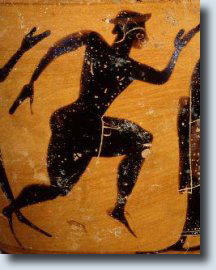
"Legend has it that, on this day in the year 490 B.C., a trained runner by the name of Phidippides of Athens, completed his mission to seek help against the invading Persian army. Phidippides had run for two days and two nights to the city of Sparta, about 140 miles away. Under religious law, he could not get the needed help until after the next full moon. And so, he ran the 140 miles again, returning to Athens without Spartan troops.
The Athenians had no time to wait for the Spartan troops; however, they were still able to win the battle against the Persians at Marathon. Wounded, Phidippides took to the road again, running the 26 miles from Marathon to Athens to carry the news of the victory. His last words before he collapsed and died, “Rejoice, we are victorious.”
In honor of Phidippides, the 26-mile marathon became part of the Olympic Games held in Athens in 1896. A year later, the Boston Marathon was held for the first time, making it the oldest marathon race in the United States.
At the Olympic games in London in 1908, 385 yards were added to the 26-mile marathon in order for the runners to pass King Edward VII’s royal box in White City Stadium. This 26.2 mile distance was made the official Olympic marathon distance in 1924 at the Paris Olympics." (From 440 International, Those Were The Days)
Round Midnite: Germany Invades An Unsuspecting Poland
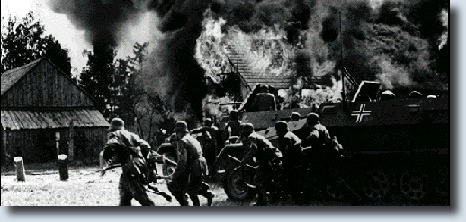
German SS troops put on a false attack on a German radio station at
Gliewitz. Dressed in Polish uniforms to convince the world that Poland
is the aggressor nation and to justify their comming invasion of Poland.
September 1, 1939
"At 4:45 a.m., some 1.5 million German troops invade Poland all along its 1,750-mile border with German-controlled territory. Simultaneously, the German Luftwaffe bombed Polish airfields, and German warships and U-boats attacked Polish naval forces in the Baltic Sea. Nazi leader Adolf Hitler claimed the massive invasion was a defensive action, but Britain and France were not convinced. On September 3, they declared war on Germany, initiating World War II.
To Hitler, the conquest of Poland would bring Lebensraum, or "living space," for the German people. According to his plan, the "racially superior" Germans would colonize the territory and the native Slavs would be enslaved. German expansion had begun in 1938 with the annexation of Austria and then continued with the occupation of the Sudetenland and then all of Czechoslovakia in 1939. Both had been accomplished without igniting hostilities with the major powers, and Hitler hoped that his invasion of Poland would likewise be tolerated.
To neutralize the possibility that the USSR would come to Poland's aid, Germany signed a nonaggression pact with the Soviet Union on August 23, 1939. In a secret clause of the agreement, the ideological enemies agreed to divide Poland between them. Hitler gave orders for the Poland invasion to begin on August 26, but on August 25 he delayed the attack when he learned that Britain had signed a new treaty with Poland, promising military support should it be attacked. To forestall a British intervention, Hitler turned to propaganda and misinformation, alleging persecution of German-speakers in eastern Poland. Fearing imminent attack, Poland began to call up its troops, but Britain and France persuaded Poland to postpone general mobilization until August 31 in a last ditch effort to dissuade Germany from war.
Shortly after noon on August 31, Hitler ordered hostilities against Poland to begin at 4:45 a.m. the next morning. At 8 p.m. on August 31, Nazi S.S. troops wearing Polish uniforms staged a phony invasion of Germany, damaging several minor installations on the German side of the border. They also left behind a handful of dead concentration camp prisoners in Polish uniforms to serve as further evidence of the supposed Polish invasion, which Nazi propagandists publicized as an unforgivable act of aggression.
At 4:45 a.m. on September 1, the invasion began. Nazi diplomats and propagandists scrambled to head off hostilities with the Western powers, but on September 2 Britain and France demanded that Germany withdraw by September 3 or face war. At 11 p.m. on September 3, the British ultimatum expired, and 15 minutes later British Prime Minister Neville Chamberlain went on national radio to solemnly announce that Britain was at war with Germany. Australia, New Zealand, and India followed suit shortly thereafter. At 5:00 p.m., France declared war on Germany.
In Poland, German forces advanced at a dizzying rate. Employing a military strategy known as the blitzkrieg, or "lightning war," armored divisions smashed through enemy lines and isolated segments of the enemy, which were encircled and captured by motorized German infantry while the panzer tanks rushed forward to repeat the pattern. Meanwhile, the sophisticated German air force--the Luftwaffe-- destroyed Polish air capability, provided air support for the blitzkrieg, and indiscriminately bombed Polish cities in an effort to further terrorize the enemy.
The Polish army was able to mobilize one million men but was hopelessly outmatched in every respect. Rather than take a strong defensive position, troops were rushed to the front to confront the Germans and were systematically captured or annihilated. In a famously ill-fated strategy, Polish commanders even sent horsed cavalry into battle against the heavy German armor. By September 8, German forces had reached the outskirts of Warsaw, having advanced 140 miles in the first week of the invasion.
The Polish armed forces hoped to hold out long enough so that an offensive could be mounted against Germany in the west, but on September 17 Soviet forces invaded from the east and all hope was lost. The next day, Poland's government and military leaders fled the country. On September 28, the Warsaw garrison finally surrendered to a relentless German siege. That day, Germany and the USSR concluded an agreement outlining their zones of occupation. For the fourth time in its history, Poland was partitioned by its more powerful neighbors.
Despite their declaration of war against Germany, Britain and France did little militarily to aid Poland. Britain bombed German warships on September 4, but Chamberlain resisted bombing Germany itself. Though Germans kept only 23 divisions in the west during their campaign in Poland, France did not launch a full-scale attack even though it had mobilized over four times that number. There were modest assaults by France on its border with Germany but these actions ceased with the defeat of Poland. During the subsequent seven months, some observers accused Britain and France of waging a "phony war," because, with the exception of a few dramatic British- German clashes at sea, no major military action was taken. However, hostilities escalated exponentially in 1940 with Germany's April invasion of Norway and May invasion of the Low Countries and France.
In June 1941, Hitler attacked the USSR, breaking his nonaggression with the Soviet Union, and Germany seized all of Poland. During the German occupation, nearly three million Polish Jews were killed in the Nazi death camps. The Nazis also severely persecuted the Slavic majority, deporting and executing Poles in an attempt to destroy the intelligentsia and Polish culture. A large Polish resistance movement effectively fought against the occupation with the assistance of the Polish government-in-exile. Many exiled Poles also fought for the Allied cause. The Soviets completed the liberation of Poland in 1945 and established a communist government in the nation." (From The History Channel)